Have you ever thought about how often we talk about love?
It’s fair enough, I guess.
I mean love makes the world go round! All you need is love! Love is everything! Right?
At least it’s a big part of our lives.
So have you ever found it strange how we often talk about love like it’s a war?
Or sometimes like it’s just a journey?
And what about time?
Why do we talk about it like it’s money or even a journey?
Why can’t it just be … time?
Well — because these things are abstract, so we use metaphors to describe them.
But it turns out that it’s not just love and time that we turn into metaphors.
In fact — it seems to be everything.
You’ll probably find that it’s next to impossible to describe love, or ideas, or the mind, or how you feel right now without using metaphor.
Go ahead … Try it!
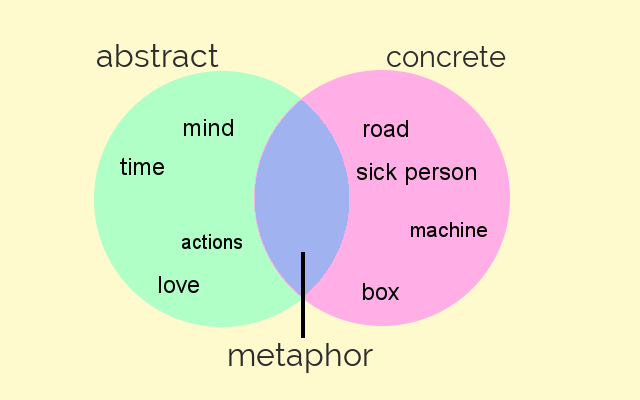
Back in 1980, two linguistic philosophers, George Lakoff and Mark Johnson, wrote a groundbreaking (another metaphor there) book, called “Metaphors We Live By”.
It’s about how metaphors are one of the main ways that we create meaning with language.
So today, I’d like to look at some of Lakoff and Johnson’s observations, and discuss them with you.
Ready to join me on our mission to look at the world in new and interesting ways?
Let’s go!
A lot of things are containers
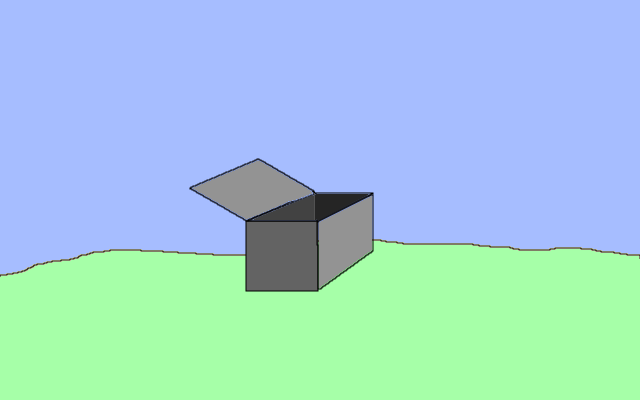
Here’s a box!
This box is going to represent the way we describe some things in English as containers.
When we have a super abstract concept like “activity” or “state of mind,” sometimes it helps us to think of them like this.
When we use these “container” metaphors, there are usually four positions we can be in.
- Being outside or out of the container.
- Entering, falling into or going into the container.
- Being in the container.
- Leaving, exiting or falling out of the container.
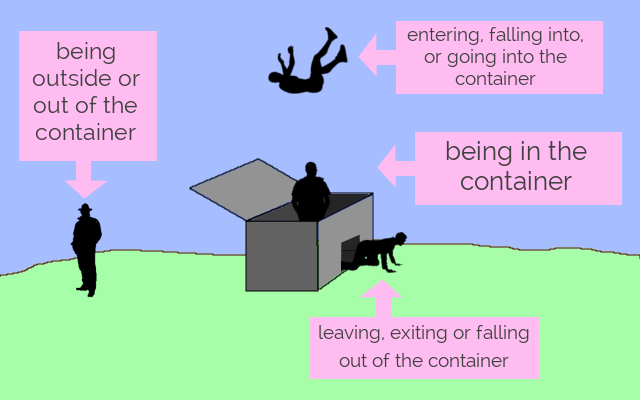
States and containers
This happens a lot with states.
We’re out of trouble now.
You’re out of shape!
She’s falling in love again.
I was in a state of ecstasy!
He finally emerged from the coma.
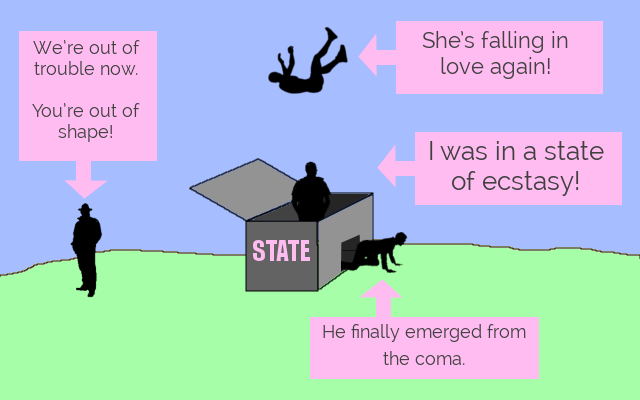
Actions and containers
We can also imagine our actions like this, too:
Outside of playing giraffe tennis, do you do any other sports?
I’ve really got into waking up early recently.
Don’t bother with him. He’s completely immersed in solving that puzzle he found online.
How can I get out of washing Mr. Miyagi’s car?
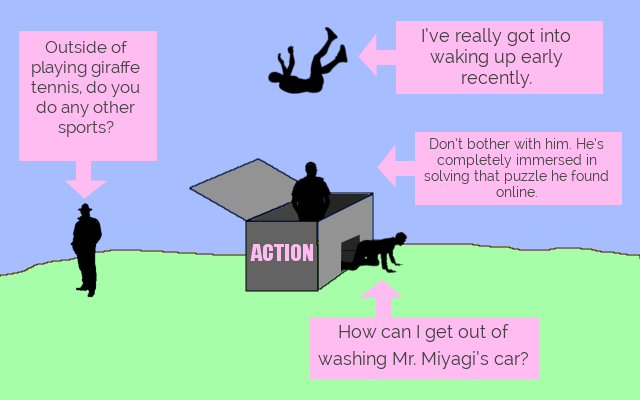
Life is a container
Life, too, can be a container.
So that’s when I decided I needed to be out of her life forever.
As soon as that horrible man walked into my life, I knew there’d be trouble.
There’s not much left for me in life.
You need to take the most out of life!
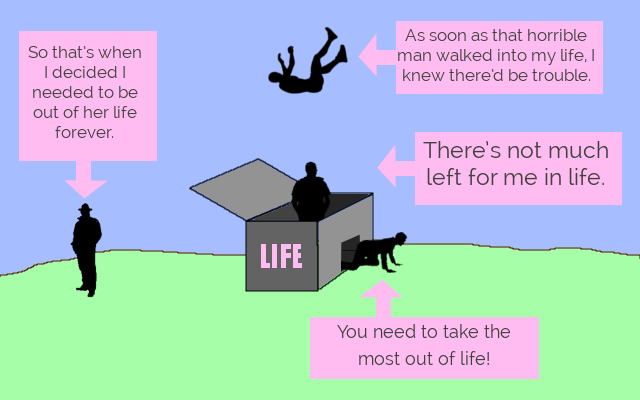
Up and down
While we’re still thinking in terms of 3-dimensional things (like boxes), let’s look at another, even more common, way we use metaphor to deal with abstract concepts.
Up and down.
Two small, simple little words.
But you’d be amazed how much we can express with them.
Let’s take a look!
Happy is up, sad is down
It will almost certainly not surprise you to learn that we often use phrases with “up” or verbs that mean “go up” to mean happy and phrases that mean “down” or verbs that mean “go down” to describe being unhappy.
That’s why we’re unhappy when we feel down or when we’re depressed.
It’s why we can fall into a depression or why your spirits can sink and leave you in a slump.
On the bright side (another metaphor), it’s also why a smile from the right person can boost your spirits and can give you a lift, leaving you on top of the world.
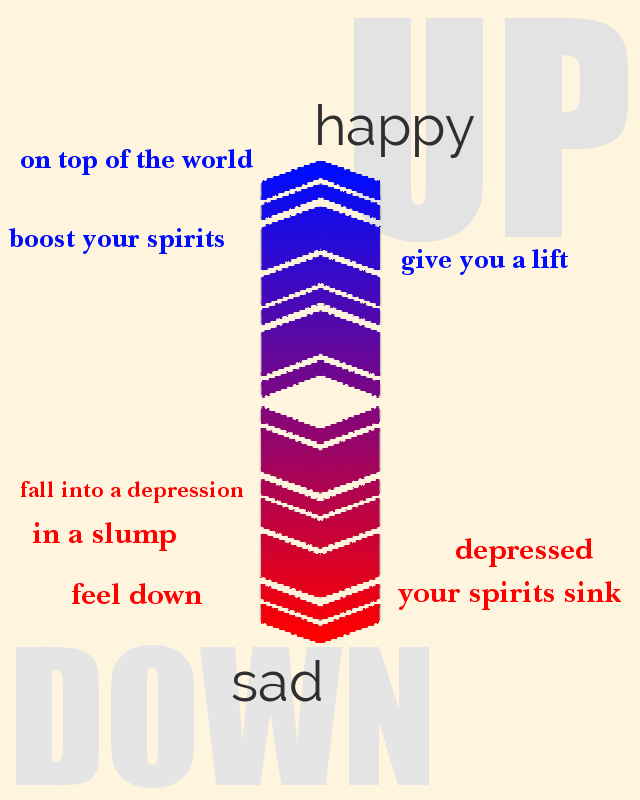
This makes sense. As Lakoff and Johnson point out — when we’re unhappy, our bodies sort of slump — our shoulders drop, our head bows and we actually get physically lower.
Meanwhile, when we’re happy, we stand more upright and physically higher.
But there’s more to this whole up-down thing. And I think they just might be related somehow.
Conscious is up, unconscious is down
Again. This is related to the physical body.
When we’re sleeping (or when someone’s knocked us out), we can usually be found in one place.
Down — either in the bed (the comfortable option) or on the floor (not so comfortable).
Either way. We’re unconscious.
So that’s why we fall asleep, or drop off.
It’s why you can sink into a coma and be under hypnosis.
All while you’re unconscious.
Conversely, it’s also why you wake up or get up or rise in the morning.
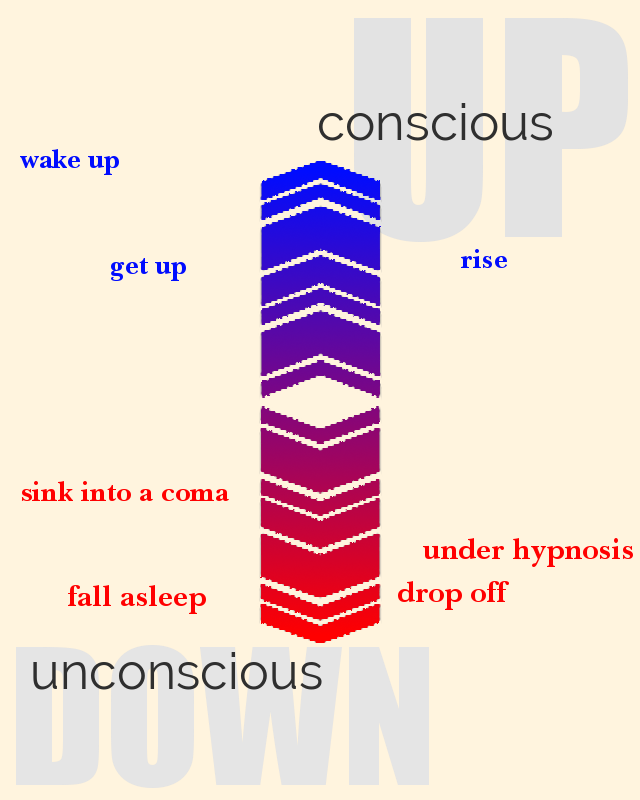
Health and life are up, sickness and death are down
Well — health and happiness are related, right?
So, up is happy, but it’s also healthy.
And down is sad, but it’s also unhealthy.
So that’s why we can come down with the flu or why our health might decline or even why sometimes people simply drop dead.
And, to finish this one positively, it’s why we can be in top shape, at the peak of health and, if we’re into the whole vampire thing, why we can rise from the dead.
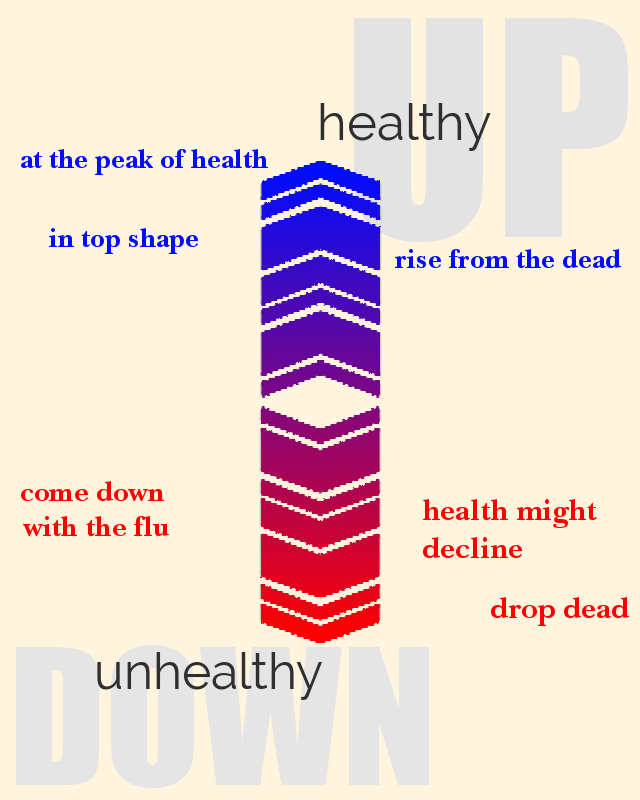
Power, control and status are up
You want more power? Then you need to go up in the world!
It seems very, very ingrained in the English language that more success and more power is like going up.
We talk about rising to the top and being at the peak of your career and having upward mobility and climbing the ladder and sometimes just being on top of the situation.
It’s also why someone might have control over you, but if that happens, you’re under their control.
We try to defeat the glass ceiling and maybe even try to bring people down when they’re too powerful.
And if you succeed, then you can say the following proverb with a smile on your face:
“The higher they climb, the harder they fall.”
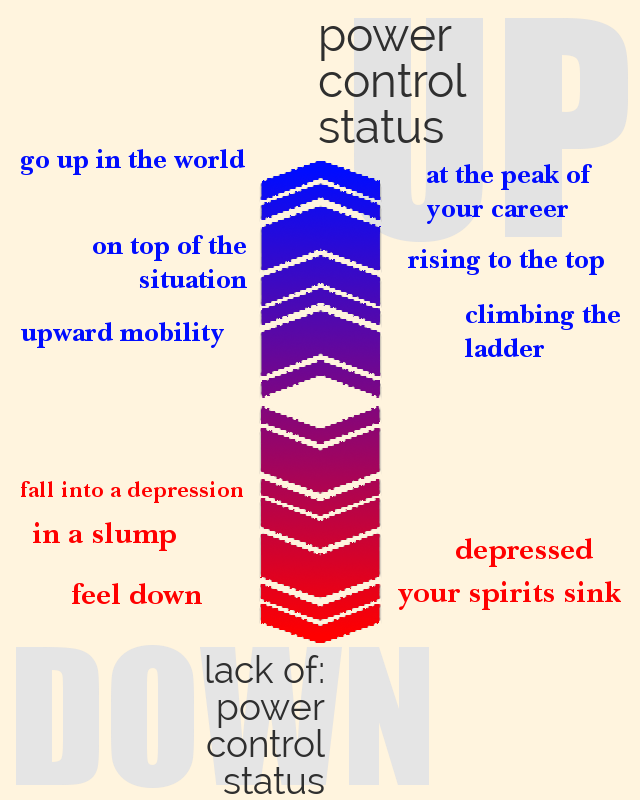
Time is …
Let’s talk about time.
Time is one of the most abstract concepts around.
In fact, it’s so abstract that Mariah Carey completely refuses to acknowledge it. Read more here.
So how do we handle the abstractness of time? How can we manage to be on time for things? Come to think of it, how do we ever get anything done at all if time doesn’t exist?
Time is a journey …
Well, one of the most common ways we do this is by imagining time as stationary and that we’re just moving through it.
So, as we go through the years further and further and further into the 2020s we might approach the end of the decade as a stronger and better species.
Let’s hope so!
I really like this point. Largely because it’s so very cultural.
It assumes that time is linear and that we move forward into the future.
But research on different cultures has shown that there are different ways of looking at time.
There’s cyclic time, mutli-active time and even some cultures who see the future as behind us and the past in front of us.
It makes sense when you hear the logic: You can see the past, so it must be in front of you; You can’t see the future, so it must be behind you.
Can’t argue with that.
Check out this article if you want more on the different ways we all look at time.
Love is …
Remember how we started this article?
Yep, with love — the most powerful force in the world (after gravity, electricity, heat and a number of other actually proven forces).
Love is a major part of our lives but also an incredibly abstract one.
So, it comes as no surprise that we describe it in so many ways.
Love is a journey
Let’s look at these with this incredibly unrealistic dialogue.
Sam: I think we need to talk. We’re clearly at a crossroads in our relationship.
Toni: OK.
Sam: I mean — when I look at how far we’ve come, I’m really proud of us. But sometimes I wonder — where are we? It feels like we’re stuck!
Toni: Yes … I …
Sam: In short, if we can’t sort it out now, then we’ll just have to go our separate ways.
Toni: Erm … right. Thing is …
Sam: Otherwise, this relationship is going nowhere — it’s a dead-end street.
Toni: Ugh — Sam?
Sam: I know it’s difficult to face our problems, but you’ll be the first to admit that our marriage is on the rocks — we’ve gone off track — or, at the very least, we’re going through a rough patch.
Toni: Sam?
Sam: Yes, Alex?
Toni: I’m not Alex. You’re married to Alex. I’m Toni — Alex’s cousin.
Sam: Oh! Sorry Toni! You both look so similar! Sorry! How’s the gardening going?
Love is a patient
A lot of people sometimes talk about their relationship as if it was a dying patient.
I guess it makes sense — when a romance looks like it’s disappearing, you might want to approach it like a doctor. With drugs!
No just joking — with care and affection.
So that’s why we talk about a healthy marriage and how the relationship is in good shape or at least on the mend and getting back on its feet.
When things are bad, the relationship can be on its last legs or even … just … die.
Love is madness
Love is madness
And here, we reach the poetic part of the post.
Love and madness.
They’ve been compared to each other ever since someone woke up one morning and decided that there should be such a thing called “poetry.”
For this, let’s just look at some classic (and not-so-classic) songs and their lyrics:
Aerosmith: Crazy
“Yeah you drive me crazy, crazy, crazy, for you baby …”
Duran Duran: Out of my mind
“Got to get you out of my mind …”
Judy Garland: Wild about Harry
“I’m just wild about Harry and Harry’s wild about me …”
Other metaphorical patterings
In this section, let’s look at some rather random, but very common, ways we use metaphors to make sense of abstract concepts.
But I don’t just want to give you a list of metaphors (though, you will be getting that, too).
Let’s look at these metaphors and ask ourselves some important questions:
- Do you use the same metaphors in your own language?
- Are these metaphors useful? Or are they damaging?
- Could we help ourselves out and make our lives better if we looked at things differently?
All the following examples are taken from Lakoff and Johnson’s Metaphors We Live By.
Argument is war
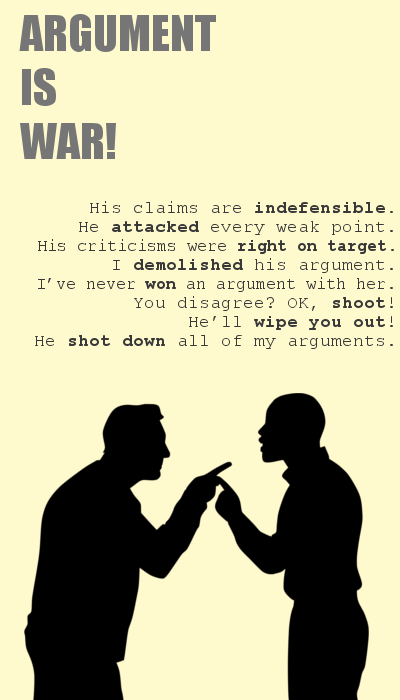
Claims are indefensible.
He attacked every weak point.
His criticisms were right on target.
I demolished his argument.
I’ve never won an argument with her.
You disagree? OK, shoot!
If you use that strategy, he’ll wipe you out.
He shot down all of my arguments.
This is an interesting one.
In these metaphors, the person we’re arguing with is our opponent. It’s a one-vs-one match. We’re fighting over ideas, but most importantly, we’re fighting each other! To the death! Well — not to the death, but it’s still a fight.
Now, is it too obvious to say that if we looked at the whole concept of argument differently, perhaps we’d all get along better?
In the age of Twitter and Facebook and CAPS LOCK and very, very divisive online culture wars, perhaps the whole approach of treating an argument like a war might … not … be … working?
Just putting that out there!
When we look at the academic world or grown-ups debating (rather than arguing), then we can see that instead of a kind of fight, they just throw the ideas around and as a result they get a deeper understanding of it.
Usually, and this is especially true with more complicated ideas, there is no conclusion. Just insights.
Perhaps, when we enter a discussion with someone about a hot topic, this might be a better approach.
Time is money
I remember back in 2003, I was protesting against the US/UK invasion of Iraq in Brighton. (I mean that I was protesting in Brighton, not that the Americans were invading a part of Brighton called Iraq.)
A bunch of us stopped at a B2 (basically like a 7/11 — a 24-hour store).
The woman who was in charge of the store when we went in was looking on at the protesters (including us) with a mixture of confusion and dislike.
“Why are you protesting? What’s the point? The war’s already started!”
I didn’t know how to begin to answer this question. While I was think of a way to explain the basics of protest politics, I noticed her t-shirt.
It said, in bold, proud letters, “Time is money. Don’t waste either one!”
I then realised where her priorities lay, paid for my crisps and rejoined the march without saying another word.
“Time is money.”
Well — in a way, she’s right. We talk about time in the same way we talk about money:
You’re wasting my time.
This gadget will save you hours.
How do you spend your time these days?
That flat tire cost me an hour.
I’ve invested a lot of time in her.
I don’t have enough time to spare for that.
You need to budget your time
Put aside some time for ping pong.
He’s living on borrowed time.
You don’t use your time profitably.
Time is something to be taken advantage of! Quick! It might go! And then you’ll be poor!
I know that this is very much a cultural thing.
However, even as someone from the west, where the “time is money” mantra is strong, I found the direct comparison of the “time is money” t-shirt quite uncomfortable.
Perhaps we would all be a little more relaxed if we thought of time as something that was just happening.
Something to be savoured in the moment, rather than something we need to collect, save and put aside.
Not my most popular idea, I know — but not my least popular.
That would be the one about the tower of bats. Don’t ask.
The mind is a machine
Clunk!
Grr!
Tick tick tick!
Hear that?
That’s the sound of my mind!

We’re still trying to grind out the solution to this equation.
My mind just isn’t operating today.
Boy, the wheels are turning now!
I’m a little rusty today.
We’ve been working on this problem all down and now we’re running out of steam.
Yep — sometimes it really feels like our minds are like a machine.
Especially first thing in the morning when we haven’t had tea yet.
But in reality, the mind is more complex.
It’s more like a network than a machine.
Maybe, if we start using phrases like, “sorry — my nodes aren’t fully linked up before coffee” or “We’re spreading all our charges to solve this issue,” then maybe we’ll work at a fuller potential?
There are actually loads more of these metaphors in English like “thoughts are food,” and “theories are buildings,” and “love is war.”
So, if you’re into these ideas, then I can’t recommend the book enough.
Meanwhile, as you continue learning English, start trying to notice these patterns.
That way, you’ll be able to develop your own phrases as you get more familiar with them.
You’ll also be able to pick up new idioms and proverbs more quickly.
Good luck!
Gabriel Clark, LOS Consultant & Clark and Miller Co-founder